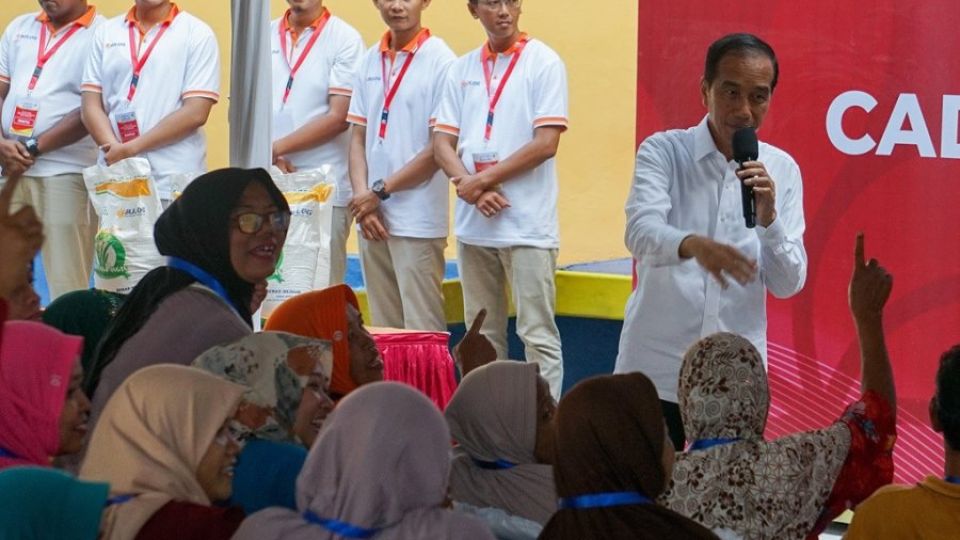February 8, 2024
JAKARTA – The government has recently acknowledged extending an ad hoc program that allows it to withhold 5 percent of ministry and agency budgets as a pool for emergent, undisclosed expenses, a policy that some experts say may be funding increased aid spending ahead of the 2024 general election.
The policy, known as “automatic adjustment”, blocks out some Rp 50 trillion (US$3.17 billion) from this year’s state budget, according to a Finance Ministry circular letter obtained by The Jakarta Post dated Dec. 29, 2023.
Ministry spokesperson Deni Surjantoro told the Post on Friday that President Joko “Jokowi” Widodo had personally ordered the continuation of the program to serve as a buffer against the economic impacts of heightened geopolitical risk.
He added that the policy had been used in the 2022 and 2023 state budgets. Two years ago, it allowed the government to spend more on fuel subsidies amid high international oil prices triggered by Russia’s invasion of Ukraine.
But experts say there is little justification for continuing the program this year, as the Indonesian economy has performed relatively well over the past few years and global uncertainty has lessened, as demonstrated by declining commodity prices and expectations of rate cuts from central banks.
At the same time, President Joko “Jokowi” Widodo has been disbursing social aid in person in a number of provinces and maintains that he is allowed to campaign for the candidate of his choice, a move that has drawn public scrutiny.
Deni of the Finance Ministry claimed the automatic adjustment funds were not for social aid, but he did not say what they were intended for.
Speaking to reporters on Monday, Coordinating Economic Minister Airlangga Hartarto said the adjustment was “one of the methods” to make room for greater fertilizer subsidies for farmers when asked whether it was used for social aid.President Jokowi, meanwhile, has denied allegations that he has been using social aid distributions to advance his eldest son Gibran Rakabuming Raka’s bid for the vice presidency, on the ticket of presidential candidate Prabowo Subianto.
Politics in, prudence out
Center of Economic and Law Studies (CELIOS) executive director Bhima Yudhistira said there could be a connection between the “automatic adjustment” and the flurry of social aid this year.
“This has led to concerns that our fiscal discipline is getting worse,” Bhima told the Post on Tuesday.
This year, the government earmarked Rp 496.8 trillion for social aid, a figure surpassing the allocations for the past few years and nearly on par with the record Rp 498 trillion worth of social aid distributed in 2020 amid the COVID-19 pandemic.
The 2024 budget does not mention anything about direct cash assistance (BLT) or rice distribution programs, both of which have continued from last year.
The government renewed a cash transfer program in January that granted Rp 200,000 per month to 18.8 million households until March. It said the policy was intended to counter increased food prices.
The Finance Ministry’s fiscal policy head, Febrio Nathan Kacaribu, said on Jan. 29 that the ministry would “look for” the money to fund the program, signaling that the financing source was still undecided.
Last year, the government disbursed similar aid in November and December 2023, citing El Niño’s impact on food prices.
It also provided 10 kilograms of imported rice per month to some 21,000 households for much of last year, again citing El Niño. The program began in March 2023 and was supposed to last for three months but was extended multiple times and is now set to end in June of this year.
Read also: President Jokowi denies politicizing social assistance
Bhima of Celios said the automatic adjustment should have been accompanied by a revision of the state budget’s macroeconomic assumptions, which would have required the budget’s structure to be changed.
University of Indonesia (UI) Faculty of Economics dean Teguh Dartanto told the Post on Tuesday that this year’s automatic adjustment would be difficult to justify.
“Hefty social aid in the middle of an election, far bigger than the amount during COVID-19, is a peculiarity or irregularity that arouses suspicion,” said Teguh, adding that the phenomenon of increased social aid during an election year was not unique to Indonesia.
The automatic adjustment, he said, was intended to help the government adapt swiftly in times of crisis, but extending the policy into more normal times would add to uncertainty instead of remedying it.
He noted that the disappearance of funds that ministries and agencies had thought they could rely on would force them to make cuts to programs.
UI economics lecturer Fithra Faisal told reporters on Friday that some of the programs that would have to be pared down or cut were of much higher priority than direct social aid.


